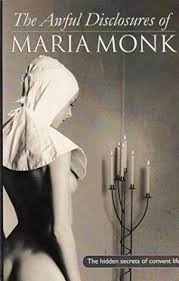

 Awful Disclosures experienced a brief surge of renewed popularity a
few decades after its initial publication, especially during the 1850s, when the Know Nothing Party was at
its height and anti-Catholic sentiment was strong. Those political forces coincided with what John Tebbel, in
his book Between Covers: The Rise and Transformation of Book Publishing in America, calls
Awful Disclosures experienced a brief surge of renewed popularity a
few decades after its initial publication, especially during the 1850s, when the Know Nothing Party was at
its height and anti-Catholic sentiment was strong. Those political forces coincided with what John Tebbel, in
his book Between Covers: The Rise and Transformation of Book Publishing in America, calls the greatest
boom the book business had ever witnessed
(71). Cheap books, bound in either cloth or paper, made reading material
available to a wider audience than ever before, and some publishers cashed in.
One of those was T.B. Peterson, a self-made Philadelphia publisher who focused on printing and selling sensational
fiction and cheap reprints (Tebbel 71). One of his staple titles appears to have been Awful Disclosures, which he
reprinted several times in the early 1850s. Tebbel also points out that many anti-Catholic tracts disguised as revelations
of convent life
actually circulated as erotic books during this period (75). This history perhaps explains the subsequent
publishing fate of Awful Disclosures, which was often reprinted in mass market paperback form in the 1960s with
covers that explicitly advertised its lurid sexual content. (See Image)